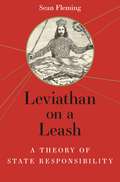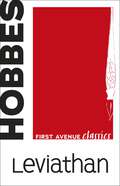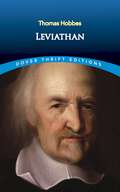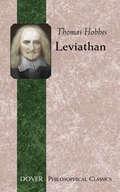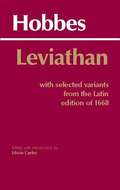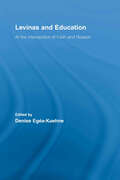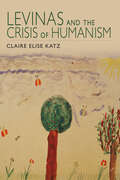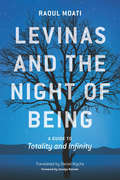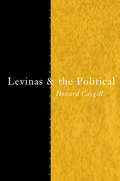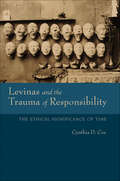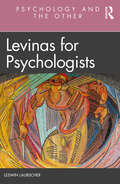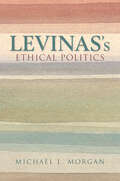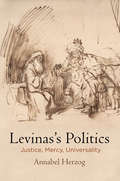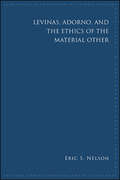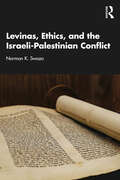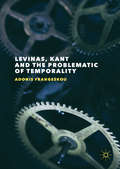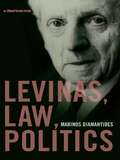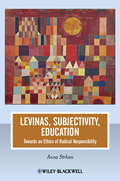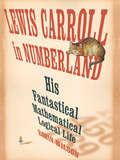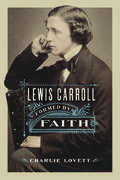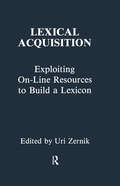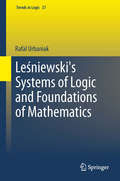- Table View
- List View
Leviathan on a Leash: A Theory of State Responsibility
by Sean FlemingNew perspectives on the role of collective responsibility in modern politicsStates are commonly blamed for wars, called on to apologize, held liable for debts and reparations, bound by treaties, and punished with sanctions. But what does it mean to hold a state responsible as opposed to a government, a nation, or an individual leader? Under what circumstances should we assign responsibility to states rather than individuals? Leviathan on a Leash demystifies the phenomenon of state responsibility and explains why it is a challenging yet indispensable part of modern politics.Taking Thomas Hobbes' theory of the state as his starting point, Sean Fleming presents a theory of state responsibility that sheds new light on sovereign debt, historical reparations, treaty obligations, and economic sanctions. Along the way, he overturns longstanding interpretations of Hobbes' political thought, explores how new technologies will alter the practice of state responsibility as we know it, and develops new accounts of political authority, representation, and legitimacy. He argues that Hobbes' idea of the state offers a far richer and more realistic conception of state responsibility than the theories prevalent today, and demonstrates that Hobbes' Leviathan is much more than an anthropomorphic "artificial man."Leviathan on a Leash is essential reading for political theorists, scholars of international relations, international lawyers, and philosophers. This groundbreaking book recovers a forgotten understanding of state personality in Hobbes' thought and shows how to apply it to the world of imperfect states in which we live.
Leviathan: Large Print (First Avenue Classics ™)
by Thomas HobbesDuring the upheaval of the English Civil War in the seventeenth century, political philosopher Thomas Hobbes composed his masterwork, Leviathan. It was first published in 1651, between the trial and execution of King Charles I and the creation of the Commonwealth of England under Oliver Cromwell. In his book, Hobbes argued that a strong and undivided central government was necessary to maintain societal order. By accepting the rule of a sovereign authority figure—which Hobbes called the "Leviathan" after the biblical sea monster—humans could avoid being ruled instead by self-interest and fear, and so escape humankind's natural state of war and violence. This is an unabridged version of Hobbes's most famous philosophical text, which established social contract theory and remained influential in political philosophy for centuries.
Leviathan: Or The Matter, Forme, And Power Of A Common-wealth Ecclesiastical And Civil (Dover Thrift Editions)
by Thomas HobbesWritten during a moment in English history when the political and social structures as well as methods of science were in flux and open to interpretation, Leviathan played an essential role in the development of the modern world. Thomas Hobbes, an outspoken royalist, fled to France during the English Civil War. There he wrote this polemic, in which he calls for a powerful sovereign — a "Leviathan" — to act as an enforcer of peace and justice. Hobbes's articulation of this long-contemplated philosophy of political and natural science was finally published in 1651, two years after the overthrow and execution of King Charles I. It met with a firestorm of controversy that included charges of treason and sedition, but survived to rank among the greatest works in the history of ideas. This edition of Hobbes's landmark work is based on the original text, offering both flavorful authenticity and the utmost clarity of expression.
Leviathan: The English And Latin Texts (Dover Philosophical Classics)
by Thomas HobbesThomas Hobbes took a new look at the ways in which society should function, and he ended up formulating the concept of political science. His crowning achievement, Leviathan, remains among the greatest works in the history of ideas. Written during a moment in English history when the political and social structures as well as methods of science were in flux and open to interpretation, Leviathan played an essential role in the development of the modern world.An outspoken royalist, Hobbes fled to France during the English civil war, where he wrote this polemic, in which he calls for a powerful sovereign — a "Leviathan" — to act as an enforcer of peace and justice. Hobbes' articulation of this long-contemplated philosophy of political and natural science was finally published in 1651, two years after the overthrow and execution of Charles I. It met with a firestorm of controversy that included charges of treason and sedition. This edition of Hobbes' landmark work is based on the original text. It incorporates the author's own corrections and retains the period spelling and punctuation, offering both flavorful authenticity and the utmost clarity of expression.
Leviathan: With Selected Variants From The Latin Edition Of 1668
by Thomas Hobbes Edwin M. CurleyDesigned to meet the needs of both student and scholar, this edition of Leviathan offers a brilliant introduction by Edwin Curley, modernized spelling and punctuation of the text, and the inclusion, along with historical and interpretive notes, of the most significant variants between the English version of 1651 and the Latin version of 1668. A glossary of seventeenth-century English terms, and indexes of persons, subjects, and scriptural passages help make this the most thoughtfully conceived edition of Leviathan available.
Levinas Unhinged
by Tom SparrowThrough six heterodox essays this book extracts a materialist account of subjectivity and aesthetics from the philosophy of Emmanuel Levinas. More than a work of academic commentary that would leave many of Levinas s pious commentators aghast, Sparrow exhibits an aspect of Levinas which is darker, yet no less fundamental, than his ethical and theological guises. This darkened Levinas provides answers to problems in aesthetics, speculative philosophy, ecology, ethics, and philosophy of race, problems which not only trouble scholars, but which haunt anyone who insists that the material of existence is the beginning and end of existence itself.
Levinas and Analytic Philosophy: Second-Person Normatvity and the Moral Life (Routledge Research in Phenomenology)
by Michael Fagenblat Melis ErdurThis volume examines the relevance of Emmanuel Levinas’s work to recent developments in analytic philosophy. Contemporary analytic philosophers working in metaethics, the philosophy of mind, and the metaphysic of personal identity have argued for views similar to those espoused by Levinas. Often disparately pursued, Levinas’s account of "ethics as first philosophy" affords a way of connecting these respective enterprises and showing how moral normativity enters into the structure of rationality and personal identity. In metaethics, the volume shows how Levinas’s moral phenomenology relates to recent work on the normativity of rationality and intentionality, and how it can illuminate a wide range of moral concepts including accountability, moral intuition, respect, conscience, attention, blame, indignity, shame, hatred, dependence, gratitude and guilt. The volume also tests Levinas’s innovative claim that ethical relations provide a way of accounting for the irreducibility of personal identity to psychological identity. The essays here contribute to ongoing discussions about the metaphysical significance and sustainability of a naturalistic but nonreductive account of personhood. Finally, the volume connects Levinas’s second-person standpoint with analogous developments in moral philosophy.
Levinas and Education: At the Intersection of Faith and Reason (Routledge International Studies in the Philosophy of Education)
by Denise Egea-KuehneThis first book-length collection on Levinas and education gathers new texts written especially for this volume by an international group of scholars well known for their work in philosophy, educational theory, and on Levinas. It provides an introduction to some of Levinas's major themes of ethics, justice, hope, hospitality, forgiveness and more, as its contributing authors address some fundamental educational issues such as: what it means to be a teacher; what it means to learn from a teacher; the role of language in the curriculum; literature, ethics, and education; moral education and human relations in schools; ethics of responsibility and philosophical-pedagogical discourse; educational hospitality and interculturalism; unconditional responsibility and education; educating for participatory democratic citizenship; the pedagogy of peace; logic, rationality, and ethics; connecting teaching to spirituality. Levinas always insisted that his aim was not to provide "a program," and accordingly, it is not the intent of the authors to look in Levinas's texts for a set of guidelines, rules, or precepts to be applied to education. Rather, this study invites educators, and researchers in philosophy and philosophy of education, to a thoughtful and critical reading of Levinas, and to engage with his unique style of analysis and questioning as they uncover with these authors the necessity and the possibility of thinking education anew in terms of ethics, justice, responsibility, hope and faith.
Levinas and the Cinema of Redemption: Time, Ethics, and the Feminine (Film and Culture Series)
by Sam GirgusIn his philosophy of ethics and time, Emmanuel Levinas highlighted the tension that exists between the "ontological adventure" of immediate experience and the "ethical adventure" of redemptive relationships-associations in which absolute responsibility engenders a transcendence of being and self. In an original commingling of philosophy and cinema study, Sam B. Girgus applies Levinas's ethics to a variety of international films. His efforts point to a transnational pattern he terms the "cinema of redemption" that portrays the struggle to connect to others in redeeming ways. Girgus not only reveals the power of these films to articulate the crisis between ontological identity and ethical subjectivity. He also locates time and ethics within the structure and content of film itself. Drawing on the work of Luce Irigaray, Tina Chanter, Kelly Oliver, and Ewa Ziarek, Girgus reconsiders Levinas and his relationship to film, engaging with a feminist focus on the sexualized female body. Girgus offers fresh readings of films from several decades and cultures, including Frank Capra's Mr. Smith Goes to Washington (1939), Federico Fellini's La dolce vita (1959), Michelangelo Antonioni's L'avventura (1960), John Huston's The Misfits (1961), and Philip Kaufman's The Unbearable Lightness of Being (1988).
Levinas and the Crisis of Humanism
by Claire Elise KatzReexamining Emmanuel Levinas's essays on Jewish education, Claire Elise Katz provides new insights into the importance of education and its potential to transform a democratic society, for Levinas's larger philosophical project. Katz examines Levinas's "Crisis of Humanism," which motivated his effort to describe a new ethical subject. Taking into account his multiple influences on social science and the humanities, and his various identities as a Jewish thinker, philosopher, and educator, Katz delves deeply into Levinas's works to understand the grounding of this ethical subject.
Levinas and the Night of Being: A Guide to Totality and Infinity
by Raoul MoatiCan we say that metaphysics is over? That we live, as post-phenomenology claims, after “end of metaphysics”? Through a close reading of Levinas's masterpiece Totality and Infinity, Raoul Moati shows that things are much more complicated.Totality and Infinity proposes not so much an alternative to Heidegger’s ontology as a deeper elucidation of the meaning of “being” beyond Heidegger’s fundamental ontology. The metaphor of the night becomes crucial in order to explore a nocturnal face of the events of being beyond their ontological reduction to the understanding of being. The deployment of being beyond its intentional or ontological reduction coincides with what Levinas calls “nocturnal events.” Insofar as the light of understanding hides them, it is only through deformalizing the traditional phenomenological approach to phenomena that Levinas leads us to their exploration and their systematic and mutual implications. Following Levinas's account of these "nocturnal events," Moati elaborates the possibility of what he calls a "metaphysics of society" that cannot be integrated into the deconstructive grasp of the "metaphysics of presence." Ultimately, Levinas and the Night of Being opens the possibility of a revival of metaphysics after the "end of metaphysics".
Levinas and the Political (Thinking the Political)
by Howard CaygillHoward Caygill systematically explores for the first time the relationship between Levinas' thought and the political. From Levinas' early writings in the face of National Socialism to controversial political statements on Israeli and French politics, Caygill analyses themes such as the deconstruction of metaphysics, embodiment, the face and alterity.He also examines Levinas' engagement with his contemporaries Heidegger and Bataille, and the implications of his rethinking of the political for an understanding of the Holocaust.
Levinas and the Trauma of Responsibility: The Ethical Significance of Time (Studies in Continental Thought)
by Cynthia D. CoeLevinas's account of responsibility challenges dominant notions of time, autonomy, and subjectivity according to Cynthia D. Coe. Employing the concept of trauma in Levinas's late writings, Coe draws together his understanding of time and his claim that responsibility is an obligation to the other that cannot be anticipated or warded off. Tracing the broad significance of these ideas, Coe shows how Levinas revises our notions of moral agency, knowledge, and embodiment. Her focus on time brings a new interpretive lens to Levinas's work and reflects on a wider discussion of the fragmentation of human experience as an ethical subject. Coe's understanding of trauma and time offers a new appreciation of how Levinas can inform debates about gender, race, mortality, and animality.
Levinas for Psychologists (Psychology and the Other)
by Leswin LaubscherLevinas for Psychologists provides a rigorous, yet accessible, examination of Emmanuel Levinas’s philosophy and its implications for psychology and the human and social sciences. Comprehensive in scope, this book traces Levinas’s thought across the arc of his oeuvre, from the earliest works to the last interviews and essays. Laubscher provides numerous examples of how Levinas’s thought challenges current clinical and psychotherapeutic work, psychological theory, social science research, and social theory but also offers promising alternatives. Such alternative ways to think and practice psychology are richly illuminated by accessible examples from therapy, research, and the social everyday. The volume makes Levinas’s dense and demanding philosophical language comprehensible and accessible, without losing the radical, profound, and poetic qualities of the original. Issues of justice, racism, and nature are addressed throughout, and these insights and conclusions are placed within a contemporary context. This book is essential reading for psychologists, philosophers, and anyone interested in the legacy of Levinas’s work.
Levinas's Ethical Politics (The\helen And Martin Schwartz Lectures In Jewish Studies)
by Michael L. MorganEmmanuel Levinas conceives of our lives as fundamentally interpersonal and ethical, claiming that our responsibilities to one another should shape all of our actions. While many scholars believe that Levinas failed to develop a robust view of political ethics, Michael L. Morgan argues against understandings of Levinas's thought that find him politically wanting or even antipolitical. Morgan examines Levinas's ethical critique of the political as well as his Jewish writings--including those on Zionism and the founding of the Jewish state--which are controversial reflections of Levinas's political expression. Unlike others who dismiss Levinas as irrelevant or anarchical, Morgan is the first to give extensive treatment to Levinas as a serious social political thinker whose ethics must be understood in terms of its political implications. Morgan reveals Levinas's political commitments to liberalism and democracy as well as his revolutionary conception of human life as deeply interconnected on philosophical, political, and religious grounds.
Levinas's Politics: Justice, Mercy, Universality (Haney Foundation Series)
by Annabel HerzogEmmanuel Levinas (1906-1995) was a French philosopher known for his radical ethics and for his contribution to Jewish thought in his commentaries on Talmudic sources. In Levinas's Politics, Annabel Herzog confronts a major difficulty in Levinas's philosophy: the relationship between ethics and politics. Levinas's ethics describes the encounter with the other, that is, with any other human being. For Levinas, the face-to-face encounter is a relationship in which the ego is commanded by a transcendent and unquestionable order to take responsibility for the other person. Politics, on the other hand, presupposes at least three people: the ego, the other, and any third party. Among three people, nothing can be transcendent; on the contrary, everything must be negotiated.Against the conventional view of Levinas's conception of the political as the interruption and collapse of the ethical, Herzog argues that in the Talmudic readings, Levinas constructed politics positively. She shows that Levinas's Talmudic readings embody a pragmatism that complements, revises, and challenges the extreme ethical analyses he offers in his phenomenological works—Totality and Infinity, Otherwise than Being, and Of God Who Comes to Mind. Her analysis illuminates Levinas's explanations of the relationship between ethics and politics: ethics is the foundation of justice; justice contains a necessary violence that must be moderated by mercy; and justice, general laws, and national aspirations must be linked in an attempt to "improve universality itself."
Levinas, Adorno, and the Ethics of the Material Other (SUNY series in Contemporary French Thought)
by Eric S. NelsonThis book sets up a dialogue between Emmanuel Levinas and Theodor W. Adorno, using their thought to address contemporary environmental and social-political situations. Eric S. Nelson explores the "non-identity thinking" of Adorno and the "ethics of the Other" of Levinas with regard to three areas of concern: the ethical position of nature and "inhuman" material others such as environments and animals; the bonds and tensions between ethics and religion and the formation of the self through the dynamic of violence and liberation expressed in religious discourses; and the problematic uses and limitations of liberal and republican discourses of equality, liberty, tolerance, and their presupposition of the private individual self and autonomous subject. Thinking with and beyond Levinas and Adorno, this work examines the possibility of an anarchic hospitality and solidarity between material others and sensuous embodied life.
Levinas, Ethics, and the Israeli-Palestinian Conflict
by Norman K. SwazoThis book engages with the philosophical thought of French-Jewish philosopher Emmanuel Levinas. It studies some of his Talmudic readings and his concern for a Jewish “universal ethics.” It does so in relation to the protracted Israeli-Palestinian conflict and the moral imperatives that apply to the conduct of the State of Israel and the Israeli Defense Forces (IDF) vis-a-vis the Palestinian people. The book not only looks at what Levinas understands about the moral “universality” of the Talmud but also applies this understanding to the assessment of the IDF military operations ongoing in Gaza since October 7, 2023. In this way, the author makes a distinction between the moral teaching of rabbinic Judaism to which Levinas appeals for its universality (on the one hand) and the ideology of political Zionism (on the other hand) to which Levinas subscribed, hence moral critique of the latter required in view of this moral teaching.A unique contribution, this book will be indispensable to scholars and researchers of European philosophy, Jewish ethics, religious studies, Talmudic studies, and contemporary moral philosophy, as well as those interested in the Israeli-Palestinian conflict.
Levinas, Kant and the Problematic of Temporality
by Adonis FrangeskouThis book offers an ethical interpretation of the Critique of Pure Reason by establishing the historical connection between the problematic of Temporality in the philosophies of Heidegger and Levinas on the one hand, and the ground-laying of metaphysics in the schematism of Kant's critical philosophy on the other. Drawing on Levinas's ethical critique of the Heideggerian problematic of Temporality together with his destructive proposal to carry out the deformalization of the Kantian notion of time in a manner consistent with Rosenzweig's philosophy, the book argues that this historical connection should be established at the point where Kant determines the ethical status of the schematism according to the regulative schemas of the ideas of pure reason, and not, as in Heidegger's ontological destruction, at the point of his determination of the sensible schemas of the pure concepts of understanding alone.
Levinas, Law, Politics
by Marinos DiamantidesEmmanuel Levinas' re-formulation of subjectivity, responsibility and the good has radically influenced post-structuralist thought. Political and legal theory, however, have only marginally profited from his moral philosophy. Levinas' theme of one's infinite responsibility for the other has often been romanticized by some advocates of multiculturalism and natural justice. In this volume, political theorists, philosophers and legal scholars critically engage with this idealization of Levinas’ ethics. The authors show that his crucial formulation of the idea of 'the other in me' does not offer a quick cure for today's nationalist, racist and religious divides. Nor does his notion of anarchic responsibility provide immediate relief for the agony of dealing with matters of life and death. The rebelliousness of Levinas' thought is rediscovered here and used to challenge preconceptions of social, legal and individual responsibility.
Levinas, Subjectivity, Education: Towards an Ethics of Radical Responsibility (Journal of Philosophy of Education)
by Anna StrhanLevinas, Subjectivity, Education explores how the philosophical writings of Emmanuel Levinas lead us to reassess education and reveals the possibilities of a radical new understanding of ethical and political responsibility. Presents an original theoretical interpretation of Emmanuel Levinas that outlines the political significance of his work for contemporary debates on education Offers a clear analysis of Levinas’s central philosophical concepts, including the place of religion in his work, demonstrating their relevance for educational theorists Examines Alain Badiou’s critique of Levinas’s work Considers the practical implications of Levinas’ theories for concrete educational practices and frameworks
Lewis Carroll in Numberland: His Fantastical Mathematical Logical Life
by Robin Wilson"A fine mathematical biography."--John Allen Paulos, New York Times Book Review Just when we thought we knew everything about Lewis Carroll, here comes this "insightful . . . scholarly . . . serious" (John Butcher, American Scientist) biography that will appeal to Alice fans everywhere. Fascinated by the inner life of Charles Lutwidge Dodgson, Robin Wilson, a Carroll scholar and a noted mathematics professor, has produced this revelatory book--filled with more than one hundred striking and often playful illustrations--that examines the many inspirations and sources for Carroll's fantastical writings, mathematical and otherwise. As Wilson demonstrates, Carroll made significant contributions to subjects as varied as voting patterns and the design of tennis tournaments, in the process creating large numbers of imaginative recreational puzzles based on mathematical ideas.
Lewis Carroll: Formed by Faith
by Charlie LovettFor Lewis Carroll, a deacon in the Church of England, faith in Christ and belief in a loving God stood at the core of his being, but little has been written about what the church or faith meant to the celebrated author of the Alice books. With Lewis Carroll: Formed by Faith, Charlie Lovett provides the first in-depth study of the religious life of the famous author, whose real name was Charles Lutwidge Dodgson.By examining Dodgson’s religious education and core beliefs, this book shows how a deep Christian faith undergirded and guided every part of his life and work, from his relationships with children to his renowned writings, his work on logic, even his hobbies of photography and theatre going. The book includes a detailed account of the career of Dodgson’s father—an important figure in the Anglican church and a key influence on his son.Family records give insight into Charles’s early education, and newly discovered manuscript materials paint a full picture of his religious education at Richmond and Rugby Schools. Lovett finds previously unknown influences in Dodgson’s life, analyzes his habits of preaching and prayer, explores his training for confirmation and ordination, analyzes his reasons for eschewing the priesthood, and concludes with an account of his death and funeral and his logically constructed theology of the afterlife. The book makes use of previously untapped sources and highlights new material, including a previously unknown sermon by Dodgson, the first ever discovered. The result is a major contribution offering new perspectives on this creator of fantastical fiction and the spiritual bedrock that informed his life and imagination.
Lexical Acquisition: Exploiting On-line Resources To Build A Lexicon
by Uri ZernikOn-line information -- and free text in particular -- has emerged as a major, yet unexploited, resource available in raw form. Available, but not accessible. The lexicon provides the major key for enabling accessibility to on-line text. The expert contributors to this book explore the range of possibilities for the generation of extensive lexicons. In so doing, they investigate the use of existing on-line dictionaries and thesauri, and explain how lexicons can be acquired from the corpus -- the text under investigation -- itself. Leading researchers in four related fields offer the latest investigations: computational linguists cover the natural language processing aspect; statisticians point out the issues involved in the use of massive data; experts discuss the limitations of current technology; and lexicographers share their experience in the design of the traditional dictionaries.
Leśniewski's Systems of Logic and Foundations of Mathematics
by Rafal UrbaniakThis meticulous critical assessment of the ground-breaking work of philosopher Stanislaw Leśniewski focuses exclusively on primary texts and explores the full range of output by one of the master logicians of the Lvov-Warsaw school. The author's nuanced survey eschews secondary commentary, analyzing Leśniewski's core philosophical views and evaluating the formulations that were to have such a profound influence on the evolution of mathematical logic. One of the undisputed leaders of the cohort of brilliant logicians that congregated in Poland in the early twentieth century, Leśniewski was a guide and mentor to a generation of celebrated analytical philosophers (Alfred Tarski was his PhD student). His primary achievement was a system of foundational mathematical logic intended as an alternative to the Principia Mathematica of Alfred North Whitehead and Bertrand Russell. Its three strands--'protothetic', 'ontology', and 'mereology', are detailed in discrete sections of this volume, alongside a wealth other chapters grouped to provide the fullest possible coverage of Leśniewski's academic output. With material on his early philosophical views, his contributions to set theory and his work on nominalism and higher-order quantification, this book offers a uniquely expansive critical commentary on one of analytical philosophy's great pioneers.
